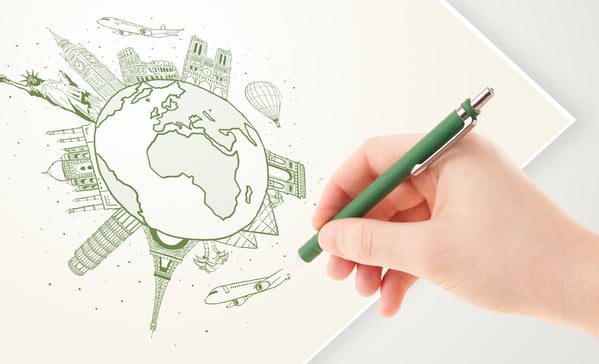A number of Caribbean countries have recently issued procurement notices or announced the planned implementation of national government-issued digital IDs, for example, Jamaica, Barbados, and The Bahamas to name a few. The common element, so far, appears to be the focus on the introduction of digital ID cards, known as eID cards. These are physical cards but with more security and intelligence than traditional ID cards. However, by the time Caribbean countries implement planned Digital ID projects, relying on physical eID cards, the rest of the world will already be moving or have moved to m-IDs i.e. digital identification hosted on mobile devices using digital identity apps. The result, for these Caribbean countries, maybe that the approach being adopted today will be obsolete by the time these expensive e-ID solutions are launched.
In an increasingly virtual world, our smart devices have become essential everyday tools to access services from banking to food delivery to travel. Governments are also following suit by implementing e-services aimed at these devices. From providing real-time alerts to citizens to calculation and payment of taxes to COVID-19 close contact tracing notifications, and more. Both public and private sector organizations are promoting the use of mobile applications as the conduit for conducting business with citizens. For example, today we take for granted not printing a boarding pass for a flight. We turn up at the electronic security barrier and hold our mobile devices over the barcode scanner to gain access to the departure area and to board the flight. And although, for the moment, we still use physical passports, how much longer before it too is phased out – more on that later. These can be scanned at the unmanned electronic gate to give us access (or not) to departure areas. While these features have been with us for a relatively short time we already use them as if they were with us forever.

The global pandemic has seen proposals for virtual travel “passports” or certificates. The International Air Transport Association (IATA), which represents 290 airlines operating in 120 countries, has recently launched its “Travel Pass” app designed to:
- Create a secure digital version of their passport on their mobile device
- Input their flight details to learn of travel restrictions and requirements
- Receive verified test results and a confirmation that they meet all travel requirements
The International Civil Aviation Organization(IACO) is developing international standards for Digital Travel Credentials (DTC). One of the options for the implementation of DTC is Type 3. Authority Issued DTC is intended to “substitute a conventional passport with a digital representation of the traveler’s identity, which can, in turn, be validated using the travel document issuing authority’s public key infrastructure.”
Google has also been working with government agencies and the International Standards Organization to produce a standard for the implementation of virtual driving licenses. The ISO Standard for Personal identification (— ISO-compliant driving license — Part 5: Mobile driving license (mDL) application), known as ISO/IEC FDIS 18013-5, is at the approval stage to become an official ISO Standard. It is intended that this mDL app will replace the physical driver’s license card that exists today.
Similarly, there is a push by countries to implement mobile national identity systems (mIDs) as either an alternative to or augment, existing eID cards. Examples of such systems are Nigeria’s Mobile Digital ID application; Estonia’s “Mobile-ID” and “Smart-ID”, Singapore’s “SingPass Mobile”, Germany’s “Mobile Ident”, India’s “mAadhaar” mobile application, and Colombia has a mobile version of their eID card since late 2020, to name a few examples.
According to Thales, a French-based multi-national that provide digital ID solutions as part of its portfolio: “ID will become ever more mobile. Of course, it doesn't take an expert to recognize we've entered an era in which mobile connectivity dominates. But it's worth emphasizing that the trend shows no sign of abating. And the implications for digital ID are profound. Look at some of the facts:
- Over 4 billion people already have access to the Internet in early 2020. The global online Internet penetration will reach 60% by the end of this year.
- 50% of global internet traffic is mobile in 2020, according to Statista. Mobile devices (also including tablets) are now the primary means of accessing the Internet for users.
- Google – a company that knows a thing or two about the future of technology - is steadily moving towards a mobile-only world.”
This view of the significant trend towards mobile is supported by an international leading digital research company, Juniper Research, “which has found that the number of digital identity apps in use will exceed 6.2 billion in 2025, from just over 1 billion in 2020. The research found that civic identity apps, where government-issued identities are held in an app, will account for almost 90% of digital identity apps installed globally in 2025; driven by the increasing use of civic identity in emerging markets and the lasting impact of the pandemic.”
According to a joint World Bank Group – GSMA –Secure Identity Alliance Discussion Paper “Advances in digital and biometric technology, combined with the already extensive use of mobile devices in the developing world offers a transformative solution to the global identity gap.”
Another paper issued by the World Bank Group and Dial (Digital Impact Alliance) concludes that “the rapid proliferation of smart mobile devices, fast-improving wireless network capabilities, and adoption of cloud technologies has resulted in easy-to-provide and easy-to-use mobile identity solutions.”
Check out Part Two of this series where we continue this conversation, focusing on the Caribbean's readiness for mID implementation.